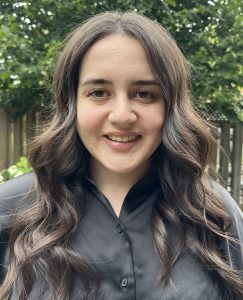- Degree Division
- Social & Behavioural Health Sciences Division
- Program Contact
- Lori Ross
For questions about the Health Promotion Program, please email: Dr. Lori Ross
Founded in 1979, the MPH Program in the field of Health Promotion is a professional (non-thesis) graduate program, preparing its graduates for a wide range of career positions found at all levels of government as well as community health-relevant agencies. Sufficient training in research methods is provided to enable students to pursue doctoral studies and careers in health promotion/public health research.
The program takes an explicitly social science perspective in addressing issues related to the health of individuals, communities and populations. In particular, special attention is given to identifying, understanding and addressing the societal and personal determinants of health. Mutually reinforcing health promotion and public health strategies are covered such as health education and communications, community development, the role of organizational development and change, health advocacy, and the development of health promoting public policy.
Program Goals
- To train students to assess the health promotion needs of groups and communities, as well as design, implement and evaluate the impact of a broad array of health promotion strategies, programs and policies.
- To develop student research skills as a foundation for applied health research in the field of health promotion and public health (e.g., community health needs assessments, program evaluations), and/or as a foundation for further graduate study either in our own PhD programs or at other universities.
- Strives to ensure that its graduates have developed core health promotion competences that will enable them to contribute as practitioners and researchers in the fields of health promotion and public health.
Program Objectives
- Graduates will have a clear understanding of the issues related to the practice of health promotion
- Graduates will have a thorough understanding of the concepts of health and illness
- Graduates will appreciate that health promotion primarily involves changing the social and physical conditions that produce illness and disease, or enhance health
- Graduates will possess a critical understanding of the range of theoretical approaches, methods and strategies required for responding to health-related issues
- Graduates will possess the skills required for developing, implementing and evaluating health promotion interventions
- Graduates will possess skills required for assessing the health needs of individuals and communities
- Graduates will possess skills required for designing, implementing and evaluating health promotion interventions
- Graduates will possess skills in research and evaluation of health promotion interventions
- Graduates will possess the ability to critically appraise and use statistics, health surveys and epidemiological data
- Graduates will possess the ability to work effectively across disciplines, across sectors, and with members of the public
- Graduates will possess the ability to reflect on their own value system, and how it has an impact on professional behavior
- Graduates will possess a thorough understanding of the Canadian political system and its relation to health
- Graduates will have a thorough understanding of the social and political determinants of health and illness in Canada
- Graduates will recognize the effect of ideology on problem definition and choice of solution to health issues in Canada and internationally
Career Opportunities
Our graduates have developed successful careers in a wide array of settings in academic, public and private sectors (both in Canada and overseas); they are working with a diverse communities and populations, and are addressing a range of health and social related issues to promote equity and social justice
Types of Organizations
- Municipal, Provincial and Federal Governments
- Universities
- Hospital or Community Health Centres
- Non-Profit
- Research Institutions
- NGO
- Consulting
- Community and Social Services
Examples of Employers
- Centre for Addiction and Mental Health
- Public Health Agency of Canada (PHAC)
- Access Alliance
- City of Toronto
- Public Health Ontario
- Peel Public Health
- Mike’s Hospital
- Well-Living House
- Ontario Tobacco Research Unit
- Women’s College Research Institute
- The Wellesley Institute
- Grand Challenges Canada
- World Health Organization
- The Canadian Observatory of Homelessness
- Egale Canada Human Rights Trust
Admission Criteria
MPH students are admitted under the General Regulations of the School of Graduate Studies (SGS) and should hold an appropriate bachelor’s degree or its equivalent from a recognized university with at least a mid-B average in final year of the degree, or in the last 5.0 full course equivalents completed at a senior level. Proof of English Language Proficiency is required (See below).
Minimum Admission Requirements for MPH Health Promotion
- at least one undergraduate statistics course. There is a requirement for a minimum grade (B+ or higher) and content of the qualifying course(s). Please review the MPH statistics requirements information.
Entry into this program is very competitive; approximately one in ten applicants is offered admission each year. In addition to recruiting top students from a wide variety of undergraduate science and humanities programs, we are especially interested in receiving applications from mature applicants who have work or volunteer experience in health-relevant fields. Relevant fields might not deal specifically with health but might, for example, concern issues related to marginalization, social justice, inequity, etc.
International applicants
No applicant will be admitted without evidence of English Language Proficiency (ELP). As per the policy of the School of Graduate Studies (SGS), the following applicants do not have to provide direct supporting evidence of ELP in the application.
- A Canadian citizen who studied at a Canadian university where instruction is in English or French;
- Any applicant who has obtained a qualifying undergraduate degree from an institution that is recognized by the University of Toronto, and where the language of instruction and examination is uniformly English.
If either criterion above is satisfied, the application can be submitted without test scores or other proof of ELP.
Otherwise, an approved test of English Language Proficiency must be submitted at the time of application. Scores must meet the minimum requirements set by SGS and must be valid (taken within 2 years of submission of the application). See SGS website for details.
If an applicant is required to submit proof of ELP and does not include this with the application, by the application deadline, the application will be considered incomplete and inadmissible.
Applicants who studied outside Canada must consult the School of Graduate Studies website to determine whether evidence of ELP can be waived. The SGS website lists those countries where university instruction in English will be recognized without further documentation. Click here for more information.
The SGS website also has an international degree equivalency tool that may be consulted to determine minimum admission requirements for graduates from recognized institutions outside Canada. Admission eligibility cannot be determined until a complete application is submitted. We are not able to review or assess your academic record without an official application to a graduate degree program, including payment of the appropriate application fee.
Program Requirements
Students are required to complete 10.0 Full Course Equivalents (FCEs) within the maximum time limit of 3 years as a full-time student and 6 years as a part-time student. Please note, most full-time students complete their degree within 2 years. The table below outlines the usual distribution of required and elective courses, together with practica, which are taken throughout the program.
| TERM | Course/practicum | FCEs |
| Term 1 – Fall |
2.5 FCE | |
| CHL5004H | Introduction to Public Health Sciences | 0.5 |
| CHL5103H | Health Promotion 1 | 0.5 |
| CHL5105H | Social Determinants of Health | 0.5 |
| CHL5201H | Biostatistics I | 0.5 |
| CHL5401H | Epidemiological Methods I | 0.5 |
| Term 2 – Winter |
2.0 – 2.5 FCE | |
| CHL5110H | Theory and Practice of Program Evaluation | 0.5 |
| CHL5104H | Health Promotion 2 | 0.5 |
| CHL5107H | Introduction to Qualitative Research (or approved equivalent) | 0.5 |
| PLUS 1-2 approved electives | 0.5-1.0 | |
| Term 3 – Summer |
2.0 FCE | |
| CHL6010Y + CHL6012Y |
Required MPH Practicum (1.0 FCE) + Long Extension to Required Practicum (1.0 FCE) |
2.0 |
| Term 4 – Fall | 2.0 FCE | |
| CHL5300H | Public Health Policy | 0.5 |
| One approved advanced Research Methods course | 0.5 | |
| PLUS 2 approved electives | 1.0 | |
| Term 5 – Winter | 1.5 – 2.0 FCE | |
| CHL6020Y + CHL6021H |
Optional MPH Practicum (1.0 FCE) + Optional Practicum Extension (0.5 FCE) |
1.5 |
| 1 approved elective | 0.5 | |
| Or any combination of practicum and electives equaling 1.5 – 2.0 FCE |
||
| Totals | 10 |
Elective Courses
Students have an opportunity to take at least 2.0 FCE in elective courses. These courses provide an important component of the Health Promotion curriculum. Through electives, students can tailor their academic work to suit their professional needs and career interests.
Students can take courses within the Dalla Lana School of Public Health, or (with permission) from other Graduate Departments at the University of Toronto. Students also have the opportunity to take courses outside of the University of Toronto and must consult with their Program Director and the Graduate Office.
Some Popular Electives within the PHS
Practica
Students typically undertake a 16 week full-time practicum in their first year, usually in the summer term. Some students complete an optional 12-week full-time practicum in the winter term of their 2nd year. The purpose of the practicum is to enable students to develop “hands on” experience in health promotion, and to apply the theory and analytic skills acquired in the academic portion of their degree program. Read the 2017 MPH Practicum Report
More information on MPH Health Promotion Practica
Other Educational Opportunities
Collaborative Programs
Student Profiles & Contact
| Name and Contact Information | Research Area(s) of Interest |
|
Laraib Abrar (she/her)
|
Optimizing healthcare experiences, women’s health, youth mental health, disability and accessibility, and the social determinants of health, with a focus on how policy and societal factors impact well-being |
| Jessica Beshay (she/her) | Social determinants of health, health promotion, Women’s health, health equity |
|
Fatima Faruq (she/her)
|
Health equity, community empowerment, developmental policy and power, social justice, built environment and health |
| Sinead George (she/her)
|
Health equity, social determinants of health, mental health, community-based research, and qualitative methods |
|
Julia Hulbig (she/her)
|
Culturally sensitive health system integration, grassroots program development, program evaluation |
| Molly Hutchinson (she/her) | Women’s Health, 2SLGBTQIA+ Health, Health Equity, Primary Care Health Systems |
|
Jenna Keeble (she/her)
|
Health Communications, Media and Health, Knowledge Mobilization, Qualitative Research Methods, Community-Based Participatory Action Research, Arts-Based Methods, Social Determinants of Health, Health Equity |
|
Sandra Kwan (she/her)
|
Women’s Health, Harm Reduction, 2SLGBTQ+ Health, Sexual and Reproductive Health, Community-Based Research, Implementation Science |
| Louie Le Ber (they/them) | 2SLGBTQIA+ Health, Gender Affirming Care, Transgender Social and Health Policy, Social Determinants of Health |
|
(any pronouns) |
Sexual health, 2SLGBTQIA+ Health, reproductive justice, health equity, social justice; specific interest in the intersection of sexual health and disability justice, aging, and decolonization |
|
Charlotte Lipin (she/her)
|
Harm Reduction, Reproductive Health & Women’s Health, and Public Policy |
|
Julia Malchiondo (she/her)
|
Neurodiversity, Intellectual and/or developmental disabilities (IDD), health equity for the IDD population |
|
Jessica Martin (she/her)
|
Policy, climate change, episodic disability |
|
Neha Matharu (she/her)
|
Social determinants of health, health services research, health equity, mental health |
|
Emily Mishkis (she/her)
|
Chronic disease in relation to health equity and social determinants of health |
|
Shazz Mohamed Nalir (he/him)
|
Social & structural determinants of health, public health policy, community development, cost of living, affordable housing |
|
Marielle Moraleja (she/her)
|
Indigenous health, homelessness, harm reduction, health policy, health equity, community-based research. |
| Ssaraf Nawar (she/her) | Women’s Health, Maternal and Child Health, Reproductive Health, Immigrant Health, Mental Health, Gender-Based Violence and Health, Health Promotion |
|
Abisha Pathmanathan (she/her)
|
Broadly mental health, mostly on the post-secondary population |
|
Emily Peterson (she/her)
|
Pediatric Health, Women’s Health, Cancer Continuum, and Health Services Research |
|
Prenetha Raja (she/her)
|
Global Health, Women’s Health, Racial Health Inequities, Social Determinants of Health, Harm Reduction |
|
Mastoora Rizai (she/her)
|
Breast and ovarian cancer research/screening/prevention, public health program evaluation, public health policy, health systems, community engagement, health equity |
| Christina Saliba (she/her) | Mental health and substance use, harm reduction, youth, and community development |
|
Soumyaa Subramanium (she/her)
|
Critical approaches to mental health, decolonial perspectives on global mental health and women’s heath research |
|
|
Neuro-Affirming Care, Dual Diagnosis, Autism Spectrum Disorder, Participatory Action Research |
|
Gloria Umogbai (she/her)
|
Health equity, with a specific focus on anti-racism and anti-oppression |
|
Angela Wang (she/her)
|
Health equity and health justice, 2SLGBTQI+ health, women’s health, urban health, race and racism, poverty, homelessness, transformative social justice |
| Jennifer Zhang (she/her) | Health Equity, Mental Health, Social Justice, Women’s Health, 2SLGBTQ+ Health, Social Determinants of Health, Community Engagement, Public Health Law, Program Evaluation, Qualitative/Mixed Methods, Health Promotion |
Frequently Asked Questions
What is health promotion?
The MPH Program in Health Promotion is guided by the Ottawa Charter for Health Promotion (1986) which defines health and health promotion in the following way:
“Health promotion is the process of enabling people to increase control over, and to improve, their health. To reach a state of complete physical, mental and social well-being, an individual or group must be able to identify and to realize aspirations, to satisfy needs, and to change or cope with the environment. Health is, therefore, seen as a resource for everyday life, not the objective of living. Health is a positive concept emphasizing social and personal resources, as well as physical capacities. Therefore, health promotion is not just the responsibility of the health sector, but goes beyond healthy life-styles to well-being”
There are three ways to think about health promotion: as field of study, as a field of practice, and as a profession.
- As a field of study: Health promotion integrates and employs values, theory, evidence, research methodologies, and practices from a wide range of disciplines, including: the social sciences (e.g., sociology, psychology, anthropology, political science); health sciences (e.g., epidemiology, biostatistics, public health); other inter-disciplinary fields (e.g., education, social work, women’s studies, international development)
- As a field of practice: health promotion is the multidisciplinary field of practice that is concerned with designing, implementing, and evaluating interventions (i.e., program, policies, services) that enable individuals, families, groups, organizations, and communities, to play active roles in achieving, protecting and sustaining health.
- As a profession (NOTE: health promotion is not a regulated profession): Health promotion is the profession that is committed to employing health promotion best practices, that is: theories and beliefs, evidence, and understanding of the environment that are most likely to achieve health promotion goals with respect to any health-related issue, in a given context or situation; in addition, health promotion employs processes and activities that are consistent with health promotion values, goals, ethics.
How do we assess applications to the MPH Program in Health Promotion?
We employ five criteria in assessing applications to our Health Promotion Program, namely:
- Academic grades
- Social science background
- A statement of intent outlining your vision of health promotion and your reasons for wishing to enter the program (max. 2 pages)
- Experience in paid or volunteer capacities, addressing determinants of health (e.g., social justice and health inequities)
- Two letters of reference from persons familiar with applicants’ academic and/or paid/volunteer work performance
In general, admission is sufficiently competitive that we can insist on a high level of excellence in all five domains. Not surprisingly, we prefer applicants with demonstrated capacity to excel in their studies. Nearly all of our successful candidates possess A’s in their final two undergraduate years; many have an A average; but we emphasize that grades are not the primary consideration.
We are looking for candidates who jump off the page because of their passion and (demonstrated) commitment to making the world a better place.
We are not interested in candidates who see health promotion primarily in terms of “teaching” people about “lifestyle” health promotion (e.g., smoking, diet, exercise); while lifestyles are important, we are looking for candidates who understand the broad determinants of health, and can fit lifestyles into this context.
Regarding social science background: Social science includes sociology, psychology, anthropology, economics, political science, or social science based interdisciplinary programs (e.g., health studies, international development, women’s studies, indigenous health)
We are looking for exposure to social science concepts and ideas that will help students understand the world and how it operates; social science courses also tend to enhance students’ writing ability (i.e., essays, as opposed to lab reports).
Regarding letters of intent: Candidates’ letters of intent and experience take precedence over grades and social science courses. We are looking for candidates with a passion for equity and social justice, who understand that health promotion is more than just lifestyles health education, can think and express themselves cogently about the social (i.e., broad) determinants of health, who have a sense of where they are going, and who can write well
Regarding applicants’ experience: We value paid and volunteer experience in public health and other community settings that address issues of equity and social justice, and social determinants of health.
We do not place a lot of weight on health care/clinical experience—though experience with marginalized populations and social justice issues within health care settings is given considerable weight.
Field experience is less important for candidates who clearly identify an interest in continuing their academic studies (e.g., doctoral level studies); in this case, research experience will take precedence (e.g., honours thesis, RA experience, presentations/manuscripts) .
Regarding letters of reference: Letters of reference are often the weakest element in candidates’ applications. Reference letters are often poor because: (1) Applicants do not choose the most appropriate people to write their references letters; (2) letters fail to provide very positive support for the candidate, and/or (3) letters provide little supporting evidence or “argument” in favour of the applicant.
I’m interested in pursuing a PhD or doing research after completing this program. Is this possible?
Students who wish to proceed to a PhD program at the University of Toronto, or elsewhere, should give careful consideration to the expectations and requirements of the PhD programs to which they might be applying. In general, it is especially important to ensure that, by the time prospective PhD applicants have completed their MPH program, they will have acquired the necessary knowledge and experience related to both relevant theories and relevant research methods.
Potential PhD applicants should carefully consider how they will be able to demonstrate that they are familiar with theories and research methods that are relevant to his/her proposed research program.
Applicants coming from strong undergraduate social science programs (e.g., sociology, psychology) are often well prepared to address the demands of PhD programs with respect to both theory and research methods—though, of course, their application to PhD programs would be strengthened by taking additional courses related to theory and/or research methods.
Students who do not possess a strong undergraduate background in social science are very strongly advised to strengthen their knowledge and skills with respect to theory and research methods. While enrolled in our MPH Program, students can enhance their familiarity with relevant theories by taking courses that specifically deal with theories and/or conceptual frameworks (e.g., CHL5101H: Social Theory of Health; CHL5804H: Health Behaviour Change). Knowledge and skills related to appropriate research methods can be acquired by taking courses (e.g., regarding biostatistics/epidemiology, statistics, qualitative methods, survey methods), and by involvement in research projects throughout a student’s MPH Program.
The two MPH practica are especially valuable for acquiring research knowledge and skills; for this reason, undertaking research-based practica is recommended for students contemplating a PhD program in the future. Research-based practica can include field-based research with a community agency, or involve work as a research assistant on a funded research study led by your academic supervisor or another faculty member—but it need not be limited to these options.
What kind of funding opportunities are available?
Please visit PHS Student Awards & Funding Opportunities and the School of Graduate Studies Funding Resources
Can I make an appointment with the Program Directors to discuss the program prior to applying?
Due to the high volume of applicants we cannot meet prospective students. We encourage you to attend our Open House held during the month of October to meet the program directors, faculty, current/past students. We will be happy to answer your questions. Please check our website early Fall to register.
Is there a distance learning option?
Public Health Sciences does not offer distance education (correspondence/online) courses.




















